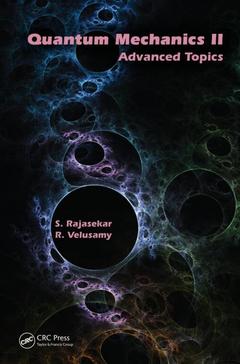Description
Quantum Mechanics II
Advanced Topics
Authors: Rajasekar S., Velusamy R.
Language: English
Subjects for Quantum Mechanics II:
Keywords
GHZ State; Quantum Field Theory; Wave Packet Spread; Classical Field Theory; Quantum Cloning; Quantum Equations for Fields; Linear Harmonic Oscillator; Quantization of Nonrelativistic Wave Equation; Quantum Teleportation; Electromagnetic Field in Vacuum; Squeezed States; Interaction of Charged Particles with Electromagnetic Field; Quantum Game; Spontaneous Emission; Quantum Lithography; Quantization of Klein–Gordon Equation; Quantum Fourier Transform; Quantization of Dirac Field; Wigner Function; Gauge Field Theor
Approximative price 148.11 €
In Print (Delivery period: 13 days).
Add to cart· 15.6x23.4 cm · Hardback
Description
/li>Contents
/li>Biography
/li>
Why the Quantum Field Theory?
Quantum Mechanics II: Advanced Topics Establishes a Need for the Quantum Field Theory Consisting of ten chapters, this illuminating text:
- Covers the basic ideas of both classical and quantum field theories
- Highlights path integral formalism, supersymmetric quantum mechanics, coherent and squeezed states, Berry's phase, Aharonov-Bohm and Sagnac effects, and Wigner function
- Addresses basic principles, salient features, and applications
- Describes basic concepts of quantum computers, some of the quantum algorithms, and features of quantum computation
- Explores advances made in the field of quantum cryptography
- Provides a brief and compact introduction to topics of growing interest including quantum versions of theory of gravity, Zeno effect, teleportation, games, cloning, diffusion, and chaos
- Focuses on the theoretical aspects of various advanced topics
- Outlines some of the quantum technologies and/or technological applications of quantum phenomena
- Presents the basic principles and salient features of ghost imaging, detection of weak amplitude object and small displacements, entangled two-photon microscopy, quantum lithography, metrology, and teleportation of optical images
- Contains several worked-out problems at the end of each chapter
- Includes material that can be covered in an advanced course on quantum mechanics
Quantum Mechanics II: Advanced Topics
Print Versions of this book also include access to the ebook version.
Quantum Field Theory. Path Integral Formulation. Supersymmetric Quantum Mechanics. Coherent and Squeezed States. Berry’s Phase, Aharonov–Bohm and Sagnac Effects. Phase Space Picture and Canonical Transformations. Quantum Computers. Quantum Cryptography. Some Other Advanced Topics. Quantum Technologies. Solutions to Selected Exercises. Index.
S. Rajasekar received his B.Sc. and M.Sc. in physics both from the St. Joseph’s College, Tiruchirapalli. In 1987, he received his M.Phil. in physics from Bharathidasan University, Tiruchirapalli. He was awarded a Ph.D. in physics (nonlinear dynamics) from Bharathidasan University in 1992. In 2005, he became a professor at the School of Physics, Bharathidasan University. His recent research focuses on nonlinear dynamics with a special emphasis on nonlinear resonances. He has coauthored a book, and authored or coauthored more than 80 research papers in nonlinear dynamics.
R. Velusamy received his B.Sc. in physics from the Ayya Nadar Janaki Ammal College, Sivakasi in 1972 and M.Sc. in physics from the P.S.G. Arts and Science College, Coimbatore in 1974. He received an M.S. in electrical engineering at the Indian Institute of Technology, Chennai in the year 1981. In the same year, he joined in the Ayya Nadar Janaki Ammal College as an assistant professor in physics. He was awarded an M.Phil. in physics in 1988. He retired in 2010. His research topics are quantum confined systems and wave packet dynamics.




